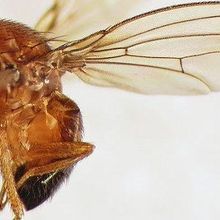model organisms

Small Model Organisms as Versatile Research Tools
Deanna MacNeil, PhD | Jul 26, 2024 | 5 min read
Flies, worms, and fish with rapid development and characterized genetics help scientists uncover fundamental and universal biological processes, and shape cutting-edge research across disciplines.

Genome Spotlight: Nile Rat (Avicanthis niloticus)
Christie Wilcox, PhD | Nov 23, 2022 | 4 min read
A reference sequence for this emerging model organism will facilitate research on type 2 diabetes and the health effects of circadian rhythm disruption.

Worms Live Longer with Mitochondria Powered by Light: Preprint
Alejandra Manjarrez, PhD | May 24, 2022 | 4 min read
Increasing mitochondrial activity in worms by engineering a light-activated proton pump into the organelle’s membrane extends the animals’ lifespan without evidence of health decline, according to a preprint.

Rat Sperm Generated from Stem Cells
Alejandra Manjarrez, PhD | Apr 7, 2022 | 4 min read
Researchers report they were able to make functional sperm in a dish, a feat previously only possible for mice.

My Daughter’s First Pet—the Next Big Model Organism?
Christie Wilcox, PhD | Jul 15, 2021 | 10+ min read
Bettas were likely the first fish welcomed into human homes. Now, scientists are welcoming them into the lab to learn how genes dictate their appearance and behavior.

“Lemon Frost” Leopard Geckos’ Cancers Similar to Human Melanomas
Christie Wilcox, PhD | Jun 24, 2021 | 6 min read
The color morph’s bright yellow hue and its propensity for skin tumors both likely stem from a gene implicated in a dangerous form of human skin cancer, suggesting the animals could make an ideal model for studying the disease.

When Severed, This Solitary Tunicate Regrows as Three New Animals
Amanda Heidt | May 13, 2021 | 4 min read
While regeneration has long been the domain of colonial tunicates, a solitary species of sea squirt was able to regenerate into multiple, fully functional individuals within a month of being cut up.

Mice Share Each Other’s Pain and Fear
Amanda Heidt | Jan 14, 2021 | 5 min read
The animals adopt the emotional state of their cagemates, and the parts of the brain engaged during the process are different for pain and fear, according to a new study.

Developmental Biologist Kathryn Anderson Dies at 68
Amanda Heidt | Jan 6, 2021 | 4 min read
The Sloan Kettering researcher used mutagenic screening to probe genes and molecular pathways, including Toll and Hedgehog, essential to development in fruit flies and mice.

Zebra Finches Recognize the Calls of Over 40 Fellow Finches
Amanda Heidt | Nov 13, 2020 | 5 min read
Their ability to distinguish between individuals is strong evidence for fast mapping, a learning tool generally thought to belong only to humans.

Regulators of Gene Activity in Animals Are Deeply Conserved
Amanda Heidt | Nov 6, 2020 | 5 min read
Enhancers, short regions of DNA that direct gene expression, of species separated by 700 million years of evolution worked interchangeably, according to a new study.

The Many Model Systems of COVID-19
Abby Olena, PhD | Nov 4, 2020 | 7 min read
Researchers turn to familiar model animals, along with some fresh strategies, to develop countermeasures against SARS-CoV-2 and investigate the biology of infection.

Those We Lost in 2019
Ashley Yeager | Dec 30, 2019 | 6 min read
The scientific community said goodbye to Sydney Brenner, Paul Greengard, Patricia Bath, and a number of other leading researchers this year.

Genetics Models Move Beyond Drosophila and the Humble Lab Mouse
Amber Dance | Sep 1, 2019 | 8 min read
Organisms with unusual genomes are helping scientists investigate gene regulation, evolution, and development.

Genetically Personalized Fruit Flies Screen for Cancer Drugs
Ruth Williams | May 22, 2019 | 4 min read
Fly avatars bearing multiple genetic changes akin to those of a cancer patient lead to a tailor-made treatment that has shrunk the patient’s tumors.

Image of the Day: Gut Feeling
Shawna Williams | Nov 28, 2018 | 1 min read
An unusual population of immune cells appears to exist in zebrafish as well as mammals.

Of Mice and Metastasis
Amanda B. Keener | Apr 1, 2018 | 7 min read
Tools for studying how cancer spreads

Opinion: Address Taxonomic Skew
Malcolm F. Rosenthal and Maydianne C.B. Andrade | May 30, 2017 | 4 min read
The domination of model organisms and charismatic megafauna in the literature is a disservice to the life sciences.

Enzyme Required for Mitochondrial Genome Destruction
Abby Olena, PhD | Mar 22, 2017 | 3 min read
Mitochondrial DNA polymerase is necessary for the destruction of paternal mtDNA in fruit fly sperm, scientists show.
